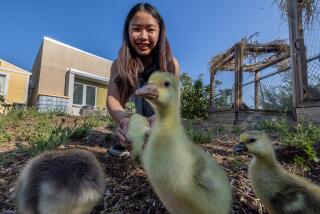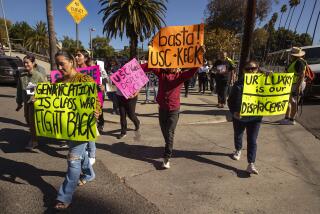Pierce College Plan Increases Uncertainty of Campus Farm : Education: The proposal envisions a high-tech agricultural center and suggests ‘innovative uses’ for some of the land.
- Share via
The Pierce College agricultural department’s latest proposal for its future calls for a high-tech instructional center that better reflects its urban surroundings, but leaves in doubt the fate of much of its 250-acre farm.
“The land is the big issue,” Mick Sears, department chairman, acknowledged.
The department does not need the entire 250 acres, but the plan “suggests some innovative uses” for it, Sears said. These include using some of the land for public recreation, open space and for revenue-generating concerns, such as golf courses or driving ranges.
While the proposal does not suggest that the college dispose of any surplus land, it already has drawn criticism from some residents who have long feared the college eventually will sell off part of the farm to developers.
“This plan assumes there will be surplus land,” complained Margo Murman, co-chairwoman of the Coalition to Preserve and Revitalize the Pierce College Farm. “We don’t believe there is any. The plan leaves out portions of land that could be leased out for development.”
Sears, however, said he hopes the proposed plan will not only save the department, but will turn Pierce into a major agricultural center.
“My goal is to maintain an agricultural department here,” he said.
For years, dwindling enrollment in traditional classes such as animal husbandry and dairy farming, coupled with interdepartmental squabbling, threatened the department with extinction.
Two years ago, the Pierce poultry operation was shut down. Last year, the college dairy closed and milk production classes were ended. A small school farm store near the dairy also closed because it had fewer college-generated products to sell.
The new plan is conceptual in nature and thus contains no cost estimates, Sears said, although the proposal calls for funding to come from non-traditional sources, including industries, trade associations and philanthropic groups that have an interest in agriculture.
“We aren’t just depending on state funding,” he said.
As part of Sears’ effort to take the department into the 21st Century, farming and animal husbandry are out in the proposal; equine science, horticulture and animal health technology are in.
“We want to better reflect the nature of the urban San Fernando Valley,” said Sears, adding that the proposal is an effort to suggest long-needed changes in the agricultural program.
“I believe we will never have an academic dairy program here again,” Sears added.
In the plan, Sears sees the existing, deteriorating agricultural buildings transformed into a modern complex that not only includes modern instructional facilities, but also a small museum devoted to the Valley’s agricultural history, a petting farm that features the latest breeds of livestock, including the exotic, and an expanded farm store.
The agricultural department proposals were submitted last month to a Pierce College advisory committee developing a five-year master plan for the school. After giving the public a chance to comment, the master plan will be sent to Pierce President Lowell Erickson and the Los Angeles Community College District board of trustees in June for their approval.
Erickson said the proposals of the agricultural department, as well as those of other departments, may be changed substantially before the master plan is completed.
“The agricultural department is only 3 1/2% of our instructional program,” Erickson said. “We have to make plans for that department in conjunction with all our other departments.”
Sears and his staff call their proposal “The Agricultural Center for Southern California.”
The curriculum emphasizes three strong instructional programs--equine science, horticulture and animal health technology, reflecting, Sears said, the urbanizing character of the Valley.
“We can move into new areas of animal health,” he said. “If not cows and sheep, then exotic birds. There is a great interest in pets, show animals, racing pigeons. . . .”
The proposal calls for new buildings featuring exhibitions, shows and other community activities to replace some of the land where sheep now graze. There is an auditorium for audio-visual programs and community events.
Part of the existing farm would be used by industry to construct and sponsor agriculture-related exhibits and community education programs that reflect water conservation, drought-tolerant landscaping, urban forestry and recycling.
But Murman of the citizens coalition to preserve the farm said the proposal should include a return to the more traditional curricula such as animal husbandry and beekeeping.
“The programs he wants to emphasize are great,” she said. “But we think we can keep the traditional programs too. We could have a really good mix. We want to pull in students from all over Los Angeles. We want the dairy back.”
More to Read
Sign up for Essential California
The most important California stories and recommendations in your inbox every morning.
You may occasionally receive promotional content from the Los Angeles Times.













